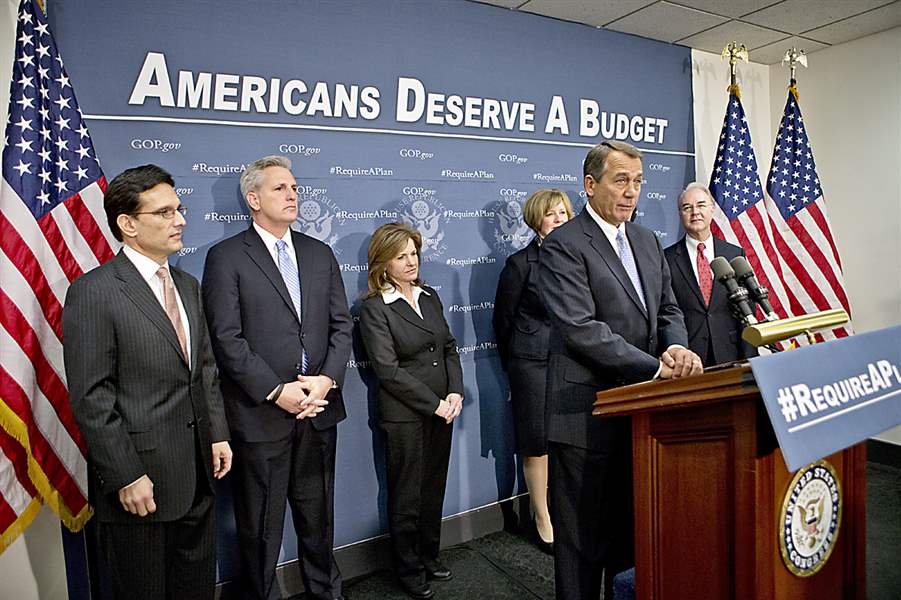
Apply balance, not a chain saw, to the budget
2/11/2013
House Speaker John Boehner of Ohio, with other House GOP leaders, speaks during a news conference on Capitol Hill in Washington last week. He urged President Obama to offer ideas to replace the automatic budget cuts known as the sequester.
ASSOCIATED PRESS

House Speaker John Boehner of Ohio, with other House GOP leaders, speaks during a news conference on Capitol Hill in Washington last week. He urged President Obama to offer ideas to replace the automatic budget cuts known as the sequester.
Here we go again.

Brown
Just when Americans thought we had survived the manufactured melodrama of the fiscal cliff and the debt ceiling, President Obama and Congress are back with another self-inflicted budget crisis with an even more obscure, ominous name: sequester.
And once more, our elected officials face a choice: Are they ready to show they finally are serious about spending and tax reform? Or will they play another game of kick-the-can-down-the-road, while their constituents watch in disgust?
“We just can’t afford as a nation to lurch from crisis to crisis,” Sen. Sherrod Brown (D., Ohio) said last week. “And you can’t cut your way into a balanced budget and prosperity. People increasingly understand that.”
Sequestration is a process that will automatically cut federal discretionary spending across the board — on everything except entitlement programs and interest on the national debt — by $1.2 trillion over the next decade. The first phase of the cuts, about $85 billion, takes effect March 1.
Two years ago, the President proposed the sequester, and lawmakers of both parties embraced it. The idea was that the cuts it required would be so big, harsh, and inflexible that politicians would have to force themselves to come up with a better long-term alternative.
Turns out they were half right. The cuts scheduled for next month are surely onerous. More than half of them come out of the Pentagon; Defense Secretary Leon Panetta warns they represent the greatest threat to military readiness in more than a decade.
The reductions in domestic spending would come in such areas as public safety, education, transportation, job training, medical research, environmental protection, and alternative energy. These are places where we should be investing further, not cutting.
Separate analyses by the Congressional Budget Office and the independent Bipartisan Policy Center predict that the sequester could cost the nation’s economy more than a million jobs — 40,000 of them in Ohio. That’s the last thing we need when the unemployment rate remains distressingly high and the economy has contracted.
But Mr. Obama and Congress evidently underestimated their own capacity for standing in the corner in which they painted themselves. Tea Party Republicans, myopic as ever, now argue that the sequester chain saw will deliver a needed jolt of fiscal austerity.
The President called last week for a temporary, better-balanced package of unspecified spending cuts and tax changes to avoid the sequester while he and Congress work on a broader plan. That may be the best anyone can hope for just now.
But the basic arithmetic won’t change: Appreciably reducing the deficit and national debt ultimately will require more revenue and less spending. Nothing will happen until both parties concede that, and act as if they mean it. The phrase “grand bargain” has lost its magic, but the need for a balanced, bipartisan compromise remains urgent.
After agreeing to revenue increases in the fiscal cliff deal — higher income tax rates for the 1 percent, less-generous treatment of capital-gains and dividend income, the end of the payroll tax holiday — GOP leaders such as House Speaker John Boehner of Ohio say they’re through talking about taxes. That attitude isn’t helpful, especially when plenty of wasteful and obsolete loopholes continue to clog the federal tax code, representing a big if hidden source of spending.
“Wall Street, the oil companies — they have done very well, and they can afford to pay a little more,” Senator Brown, a new member of the Finance Committee, told me. “Let’s close their tax loopholes before we cut more public-sector jobs.”
But no more helpful is the assertion by many Democrats and their interest-group allies that entitlement programs — Social Security, Medicare, Medicaid — must stay off the deficit-reduction table. That math just doesn’t work.
Entitlements account for 60 percent of federal spending, up from 40 percent four decades ago. They amount to more than $7,000 a year for every American, and these costs will continue to climb as the nation ages. You can’t ignore them and pare the deficit responsibly.
You can, and should, seek to limit the cost growth of entitlement programs in a way that won’t yank the safety net from beneath the most afflicted among us — the poorest and sickest and oldest. It’s easy, but not especially useful, for someone sitting behind a desk to tell someone on an assembly line or at a construction site that he or she needs to work years longer to qualify for health and retirement benefits.
Medicare and Medicaid will spend nearly $1.2 trillion this year. With that much purchasing power, the programs should be able to negotiate better rates with drug companies, doctors, and other providers.
Well-off beneficiaries can pay more for their coverage. A more-realistic definition of inflation can determine cost-of-living increases.
Above all, you can strengthen Medicare and Medicaid by attacking excessive increases in overall health care costs. As an example, Senator Brown cites provisions in the Affordable Care Act that will reward hospitals with low rates of re-admitting patients they discharged, and penalize those with high rates. “We can save tens of billions of dollars without shifting costs to patients,” he says.
Whatever you do, though, any meaningful entitlement reform will cost middle-class recipients something, since they get most of the benefits from Social Security and Medicare. That’s another hard truth that Washington, and the rest of us, must acknowledge.
Or we, and our representatives in Washington, can do nothing. We can watch the national debt soar over the next decade to a size the Congressional Budget Office estimates will reach the equivalent of 77 percent of the entire U.S. economy — more than twice what it was seven years ago.
If that happens, no program, and no taxpayer, will be safe.
David Kushma is editor of The Blade.
Contact him at: dkushma@theblade.com